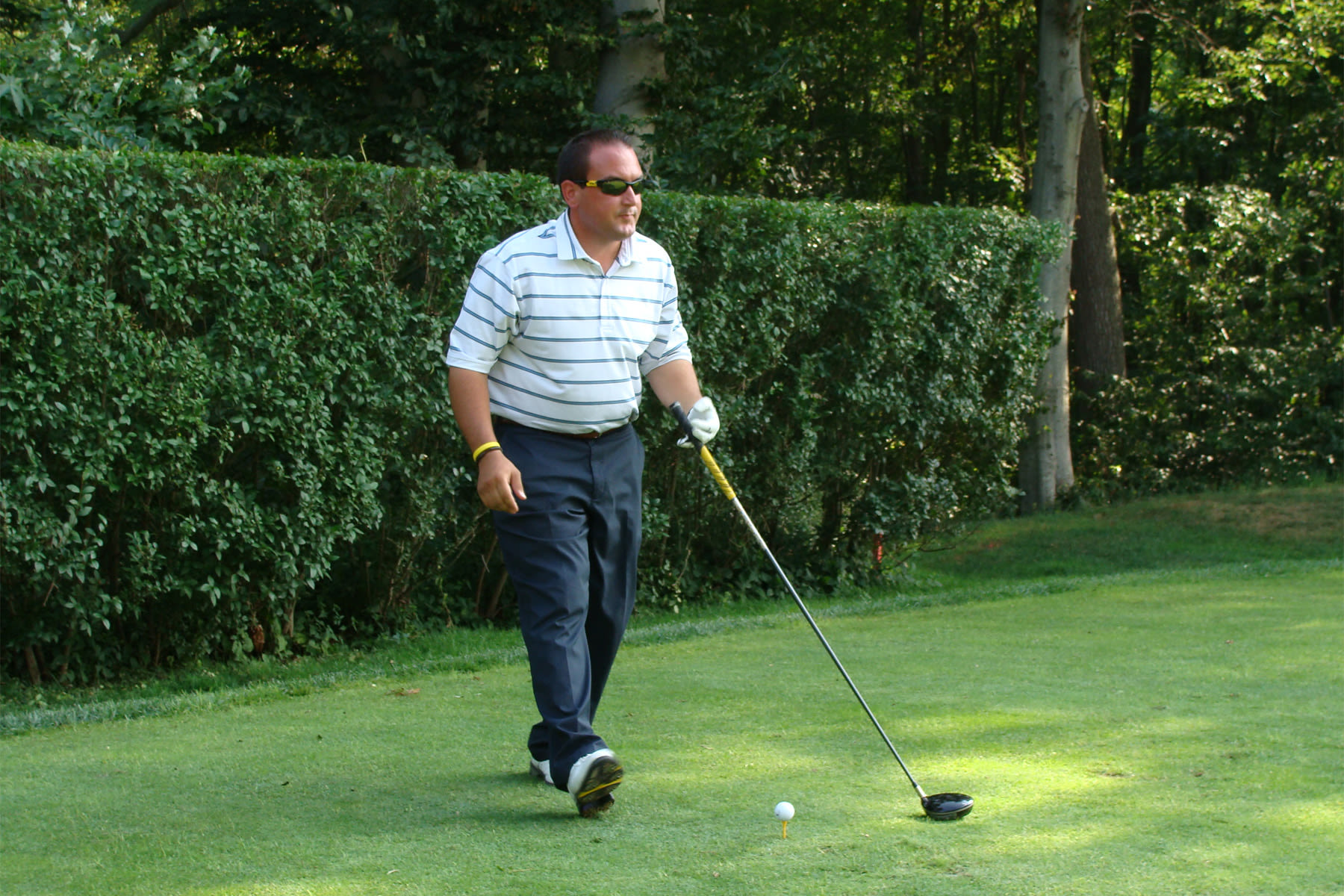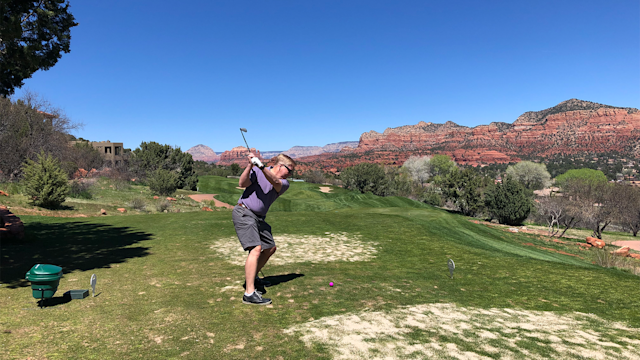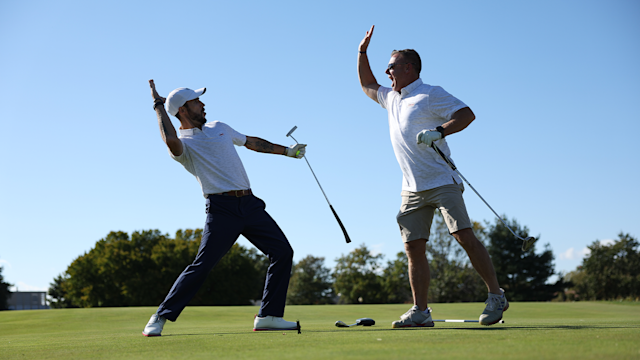Game Changers
PGA Coach Bryan DeMarco Battled Cancer With What He Learned From Golf
By Adam Stanley
Published on

Beating cancer is something worth celebrating, respecting, and finding some happiness within – it’s a long effort without a guaranteed result, not unlike golf.
But beating cancer three times? That’s a whole other level of thankful.
Bryan DeMarco, a multi-decade PGA Member who is the head golf professional at New Jersey’s Pine Barrens Golf Club, is someone who has done just that.
DeMarco, who won the Deacon Palmer Award in 2021, was first diagnosed with testicular cancer at 21. He’s now 44 with, essentially, a clean bill of health. It didn’t come without its challenges, of course, but all the while Demarco made a point to stay connected and committed to his role with the PGA.
"You would've never known anything was going on with Bryan while he was at work unless you asked him," said fellow PGA Professional and close friend, Rudy Virga, when DeMarco won the Deacon Palmer Award last year. "He didn't miss a beat; his character was above reproach.”
When DeMarco was a junior at Penn State University, in 2000, he had just started his fall semester when he noticed a lump in his groin. Being a 21-year-old college kid, he thought he was invincible. The pain, he said, didn’t go away for a while. He went for a hike on a Friday. The following Monday he saw a urologist who said there was a 100 percent chance he had to have surgery, and a 99 percent chance that what needed to be removed was cancer.
He was in for surgery on Wednesday.
After that surgery DeMarco was “pretty healthy,” he said, but after a CT scan on his abdomen, a spot near his kidney was discovered. The doctor’s plan was to remove the tumour and watch that spot. If it shrunk after chemotherapy they knew it was cancer, if it didn’t react it was likely benign.
In 2002, he was “cut up” pretty good after having fairly strong chemo but everything looked good. In the middle of all this, and on the one-year anniversary of his initial cancer diagnosis, the September 11th terrorist attacks occurred.
“I woke up that morning and I turned on the news and I was like, ‘you have to be kidding me,’” said DeMarco, whose graduation from Penn State was pushed by 18 months. He began working at a local course in 2004 in New Jersey, before moving over to Pine Barrens 10 years later.
Two years into his tenure at Pine Barrens he found a lump in his groin again.
“You sit there, and you think, ‘this can’t be it,’” said DeMarco.
Unfortunately, his local hospital did a scan and it showed multiple tumours on his abdomen and his blood work was off the charts for tumour-markers. His doctor in New York City told DeMarco he was in the one or two percent of testicular cancer patients who have a recurrence.
“I had that,” he said.
DeMarco’s scans were showing four tumours that had spread into his abdomen from that original tumour and was advised that the approach to helping him this time would be very cautious. There would be surgery and four rounds of “aggressive” chemo, as the new cocktail of drugs would have to be different than the original since his body got used to that a decade earlier.
“It made the first time around feel like a walk in the park,” said DeMarco of his second cancer battle, in 2016. “I haven’t told almost anyone this, but I lost part of my eyesight in both eyes. Like if you just looked at the sun, it was permanently like that for a month.”
Still, DeMarco never wavered with his commitment to his job or his sense of humour.
After taking a group to Kiawah after Thanksgiving last year, DeMarco was advised by his doctor that one of his routine scans had shown the cancer had come back. A tumour had grown to 10 centimeters between the aorta and kidney.
“The same surgeon from 2016 called me and when he said, ‘this is a very delicate surgery… we’re looking at potential for life-threatening blood loss,’ it gets your attention,” said DeMarco, who had just got the call from Jim Richardson saying he had won the Deacon Palmer Award for 2021.
DeMarco had a seven-hour surgery in January 2022.
“I woke up in the recovery room and said, ‘well I’m here. That’s a start,’” said DeMarco with a laugh. “I asked the nurse how many kidneys I had, and she held up two fingers. How about that, I thought. She said, ‘you know you have some of the best doctors taking care of you, right?’ I am eternally grateful for my surgeon and my doctor.”
DeMarco’s doctor appeared in the video for the Deacon Palmer Award, and it was the first time he heard him say that DeMarco was in remission, and not partial remission. The surgeon cleaned it all out.
He’s so thankful for the effort put in by the medical professionals in his life, along with everyone he’s been able to meet through golf – all of whom have been incredibly supportive on his health journey.
“The game of golf… you’re out there owning your shots. That was the approach when this first happened,” said DeMarco. “I basically came up with the worst thing. The worse-case scenario is that you can die from cancer. I could die. At that point I convinced myself if I’m not afraid of dying I can beat this, and that’s the approach that I took.
“Just like owning your shots in golf, I basically decided I was going to own this. From the beginning I was going to do whatever it took.”
Thankfully, even though golf is such an individualistic game, he had a great team on his side this whole time.
“I kept a positive attitude, and I kept fighting it. I had a lot of support from wonderful family, strong support from friends, especially during the second bout,” said DeMarco. “There’s a second extended family in the New Jersey PGA. I cannot say enough good things about all the golf professionals that I consider family in this section that supported me through the whole thing.
“In every instance I was going to do whatever it takes.”


